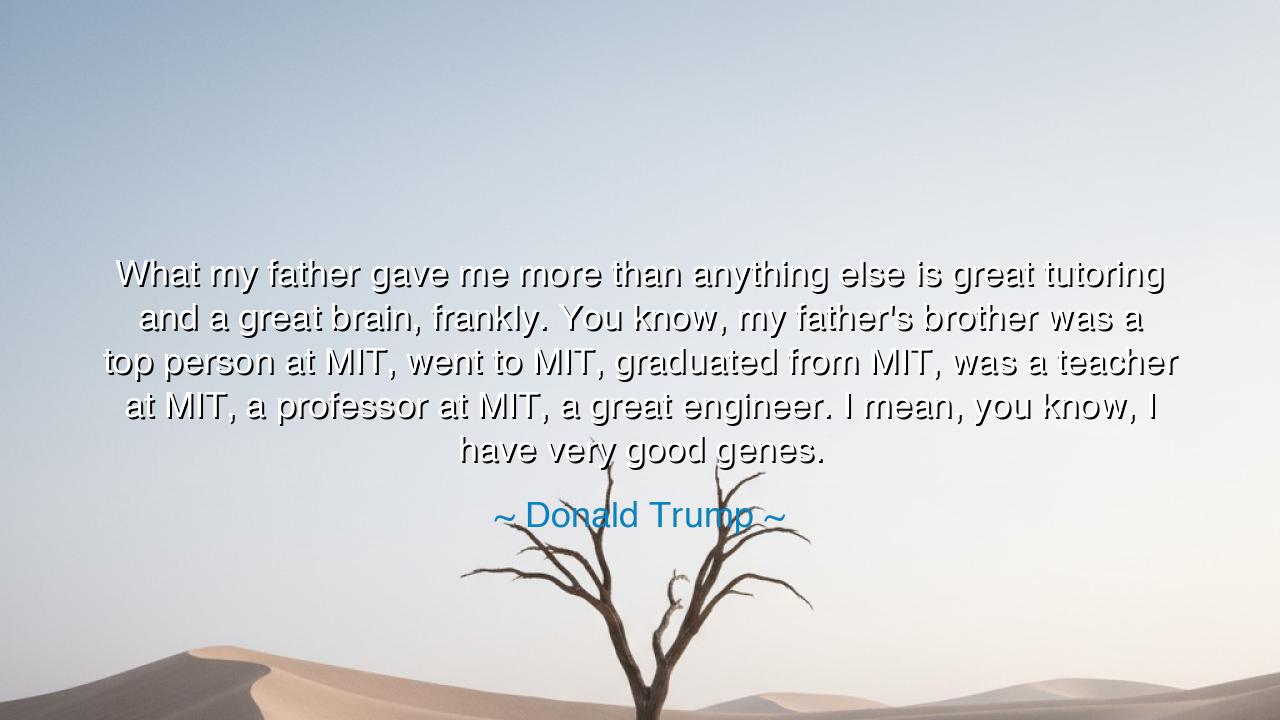
What my father gave me more than anything else is great tutoring
What my father gave me more than anything else is great tutoring and a great brain, frankly. You know, my father's brother was a top person at MIT, went to MIT, graduated from MIT, was a teacher at MIT, a professor at MIT, a great engineer. I mean, you know, I have very good genes.






In these words, Donald Trump speaks not only of inheritance in the flesh, but of inheritance in the spirit. “What my father gave me more than anything else is great tutoring and a great brain… I have very good genes.” Though spoken in his familiar tone of confidence and pride, beneath them lies an ancient truth: that every person is shaped by the forces that came before — by bloodline, discipline, and the unseen legacies of the past. Yet it is not merely the gift of ancestry that matters, but what one does with it. For even the finest seed is worthless if it falls upon barren ground.
The meaning of this quote lies in its recognition of two forms of inheritance — the genetic and the spiritual. The first is what nature bestows: the quick mind, the strong body, the temperament and talent passed down through generations. The second, however, is the inheritance of example — the habits, lessons, and resilience taught by those who raised us. When Trump speaks of his father’s tutoring, he acknowledges that wisdom and work ethic are the truest heirlooms. His “good genes,” then, are not merely in the blood but in the discipline of thought, the ambition of spirit, and the unyielding drive to achieve.
In the manner of the ancients, we may say: the river flows because the mountains stand behind it. No life exists apart from its source. The father builds the foundation upon which the son must rise higher. To speak of “good genes” is to acknowledge the continuity of greatness, the invisible thread that connects generations — from the wise to the bold, from the builder to the conqueror. But such acknowledgment carries a duty: to honor one’s inheritance by multiplying it, not wasting it in idleness. The true heir does not merely inherit the father’s name; he earns the right to continue it.
History offers countless mirrors of this truth. Consider Alexander the Great, son of Philip of Macedon. Philip gave him more than an empire; he gave him discipline, education, and a belief in destiny. He placed Aristotle at his side, as Fred Trump once guided his own son in business and ambition. Yet Alexander’s greatness did not end in inheritance — it began there. He took what was given and turned it into something vaster, carrying the dreams of his father beyond the limits of their world. This is the law of all legacy: the gift is sacred, but its use determines the measure of the man.
Trump’s words also reveal a profound human tendency — to search for the roots of one’s own strength, to trace one’s fire back to its first spark. In speaking of his uncle, a professor at MIT, Trump invokes the lineage of intellect, the pride of belonging to a chain of achievement. It is a form of ancestral gratitude, even if expressed with the modern boldness of self-confidence. For every person who has climbed high must, at some point, look backward and acknowledge the shoulders upon which he stands. Even the most self-made man is, in truth, the continuation of a greater story — one written long before his birth.
Yet the wise understand that good genes alone do not guarantee greatness. The ancients knew this well. A prince born of kings who lives without virtue will fall faster than the peasant who toils with purpose. Heritage is a torch — it gives light only to those who know how to carry it. In this, Trump’s declaration becomes both a boast and a challenge. To have “very good genes” is to be entrusted with a flame that must not be extinguished. It is to possess potential — but potential without effort is like strength without courage, a promise that remains unfulfilled.
The lesson, then, is clear: honor your origins, but do not worship them. Remember the hands that shaped you, but let your own hands build something new. If you have been blessed with talent, intelligence, or privilege, use them not for pride but for purpose. And if you were not, know that strength of will can surpass the finest bloodline. For it is not the genes that make the hero, but the heart that dares. Every generation receives a gift from the last — wisdom, struggle, opportunity — and the only question that matters is what we will give in return.
Therefore, my child, take pride in what has been given to you — whether it be brilliance, discipline, or endurance — but never forget: the truest inheritance is not in the veins, but in the virtues you choose to live by. The legacy of your fathers is the wind at your back, but it is your own steps that carry you forward. And when your time comes to speak of what you have received, let it not be only of “good genes,” but of the goodness, courage, and wisdom you have built — so that your name, too, will become the inheritance of those who follow.






AAdministratorAdministrator
Welcome, honored guests. Please leave a comment, we will respond soon